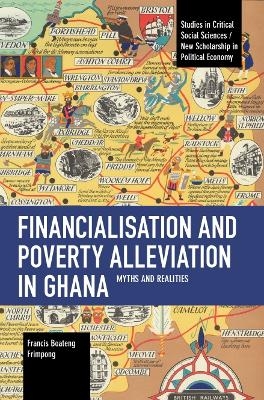
Financialisation and Poverty Alleviation in Ghana
Haymarket Books (Verlag)
978-1-64259-803-2 (ISBN)
The neoliberal policy response to the crisis in Ghana did not succeed in reversing the economic decline in either the medium or long term. In fact, quite the opposite: rather than undoing the economic decline, Francis Boateng Frimpong argues that these policy prescriptions further weakened the country’s ability to develop. This is because the policies intentionally and unintentionally encouraged factors that destabilised the possibility of the real productive assets earning commensurate returns that could facilitate the flow of capital to the real sectors and thus failed to ensure the survival of industrial enterprises. Rising profit in the financial sector incentivised financial capitalists to divert capital into financial assets at the expense of productive investment, further decelerating the pace of real capital accumulation in the country, thereby exacerbating the crisis.
Francis B. Frimpong is a Lecturer of Economics and Strategic Business Analytics at the University of East London (UEL). He is also Assistant to the Directors of the Centre for the Study of States, Markets and People (STAMP) at UEL. A recent (co-authored) publication is The Pandemic and the Economy of Africa: Conflicting Strategies between Tanzania and Ghana (2020).
Foreword
Acknowledgements
List of Figures and Tables
Abbreviations
About Financialisation and Poverty Alleviation in Ghana
1 Introduction
1 The Historical Background of Finance and Growth
2 Scope and Limitations of the Book
3 Structure of the Book
2 Neoliberalisation and Financialisation The Debate
1 Introduction
2 The Rise of Neoliberal Capitalism
3 Theoretical Debates and Historical Precedents of Financialisation
4 From Stagnation to Financialisation
5 French Regulation School Theory of Financialisation
6 Post-Keynesianism and Financialisation 7 Trans-nationalisation and Liberalisation of Finance
8 Financialisation and Poverty Alleviation: Banking the Unbanked
9 Conclusion
3 Finance-Growth-Nexus Theoretical and Empirical Literature
1 Introduction
2 The Rise of Finance and the Financialisation of Everything
3 The Financial Profit Conundrum – Profit in Marxist Economics
4 Real Commodity Accumulation and Fictitious Accumulation
5 Contemporary Heterodox Perspectives on Finance-led Growth Debate
5.1 Banks, Financial Markets and Economic Growth: The Dilemma
6 Economic Functions of Financial Intermediaries
6.1 Empirical Evidence on Finance and Growth
6.2 Cross-country Studies of the Finance-Growth Nexus
6.3 Contemporary Literature on Econometric Models for Ghana
7 Dynamics of Financial Development, Income Distribution, Economic Growth and Poverty Reduction in Ghana
8 Poverty and the Pandemic: The Case of Ghana
8.1 The Economics of It All
9 Conclusion
4 The Case of Ghana
1 Introduction
2 Country Profile and Overview of Recent Economic Performance
3 The Political Economy of Ghana: From State-led Accumulation to Neoliberalism
3.1 Political and Economic Developments from Independence (1957) to 1982
3.2 Political and EconomicDevelopments 1983–2019
4 Neoliberalism in Ghana
4.1 Neoliberalism and Housing Provision in Ghana
5 Financial Sector Reforms in Ghana – A Historical Perspective
5.1 Pre-structural Adjustment Financial Reforms 1957–1982
5.2 Post-liberalised Reforms
5.3 Relaxation of Bank Entry Restrictions, and Abolishment of Secondary Reserve Requirements 2005–2006
5.4 Recapitalising Banks
6 Financialisation in Sub-Saharan Africa: Accounting for the Ghanaian Paradox
6.1 Under-financed
6.2 … Yet Financialising
6.3 Reverse of Net Capital Flows – A Subordinate/Inferior Financialisation
7 Conclusion
5 Dimensions of Capital Structure and Liquidity Management in Ghana
1 Introduction
2 Theories of Capital Structure
2.1 Capital Structure: Traditionalists’ View
2.2 Value-irrelevance Theory by Modigliani-Miller
2.3 Capital Structure: Trade-off Theory
2.4 Capital Structure: Pecking-order Theory
3 Financialisation and Capital Structure Accumulation in Ghana
4 Classification of Capital Accumulation Process in Ghana
5 Contradictions in Political-Economic Arrangements in Ghana
5.1 Financing Challenges
5.2 Government Policies
5.2.1 Corruption
5.2.2 State of Infrastructural Development
6 Conclusion
6 The Issue of Poverty
1 Introduction
2 Poverty Measurement Conundrum
3 Absolute Poverty
3.1 Poverty in Administrative Regions
4 Relative Poverty
4.1 Using Non-monetary Deprivation
5 The Paradox of Sub-Saharan Africa’s Middle Class
5.1 The Two Competing Narratives on Africa
6 Neoliberal Globalisation and Poverty
7 Conclusion
7 Financialisation and Households From Theory to the Context of Ghana
1 Introduction
2 Theory of Consumption Function: Household Debt and the Life Cycle and Permanent Income Hypotheses
3 The Political Economy of Household Finance
4 Payment Systems in Ghana: A Route towards Financialisation
4.1 Background-Mobile Money Services in Ghana
4.2 The Role of Mobile Money in Financial Inclusion in Ghana
5 Financialisation, Financial Inclusion and Mobile Money
6 Conclusion
8 Conclusion
1 Summing Up the Argument
2 The Content of Financialisation in Ghana
2.1 Banking Sector
2.2 Industrial Enterprises
2.3 Households
3 Policy Recommendations
References
Index
| Erscheinungsdatum | 15.11.2022 |
|---|---|
| Reihe/Serie | Studies in Critical Social Science |
| Zusatzinfo | Illustrations |
| Verlagsort | Chicago |
| Sprache | englisch |
| Maße | 152 x 228 mm |
| Themenwelt | Sozialwissenschaften ► Politik / Verwaltung ► Politische Theorie |
| Sozialwissenschaften ► Soziologie ► Makrosoziologie | |
| Sozialwissenschaften ► Soziologie ► Spezielle Soziologien | |
| Wirtschaft ► Volkswirtschaftslehre | |
| ISBN-10 | 1-64259-803-8 / 1642598038 |
| ISBN-13 | 978-1-64259-803-2 / 9781642598032 |
| Zustand | Neuware |
| Haben Sie eine Frage zum Produkt? |
aus dem Bereich


